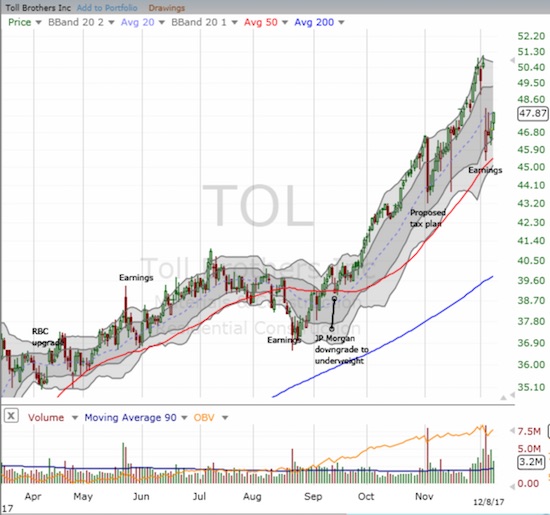In the immediate wake of the details of the Republican plan for tax reform, home builders sold off sharply. While the stock market quickly moved on, the angst in the industry continued. Toll Brothers (TOL) CEO Douglas C. Yearley plainly claimed that the proposal to reduce the cap on the mortgage interest deduction would harm the housing market.
Toll Brothers CEO: Capping mortgage interest deduction would discourage home ownership from CNBC.
Now that tax reform is a near reality, TOL’s stance clearly changed from one of resistance to acceptance. The story the company told in its earnings conference call last week lacked the subdued alarm expressed last month. In fact, according to TOL, the combined impact of all the Republican tax proposals should be a wash for its high-end customers.
TOL tried to anticipate analyst questions on tax reform and allay fears with the following assessment:
“….On the corporate side, we are encouraged by the potential reduction in the corporate tax rate as it will help our earnings and cash generation. On the personal side, while the potential reduction in the MID, real estate tax and SALT deductions not being helpful to buyers, especially in our coastal regions, we believe they may be offset by a lower stated tax rate, the doubling of the standard deduction, the potential removal of AMT, lower pass-through tax rate and the elimination of the phaseout of itemized deductions. We have always believed that our buyers are generally not tax driven when it comes to buying our home.
The issue of tax reform has been looming for months, and we haven’t seen a change in our buyers’ behavior. They continue to buy. Sales continue to be strong. With the Senate bill coming out last week, the headlines have only increased, yet this past week had the highest sales for a first week of December since 2005.”
TOL delivered two messages. First, they believe that what home buyers lose in tax benefits on buying a home, they will gain back in other deductions on income taxes. Secondly, even if the math does not quite work out, TOL’s buyers of luxury homes are so wealthy that tax implications do not impact their buying decisions anyway.
This message was not enough to divert questions. The first related question came from an analyst concerned that the elimination of deductions for state and local taxes could impact TOL’s pricing. TOL repeated its earlier assessment and then referenced the company’s detailed study of the typical buyer. They added this anecdote from the field:
“…our activity in California continues to be strong. We are not hearing from sales managers that buyers are on the sidelines, waiting to see exactly where tax reform plays out before they buy…our buyers out there are very affluent, and our business has been very good over the past couple of months as there’s been a lot of headlines about this tax reform.”
Next came this funny quote about the benefits of California-style living being well worth the extra tax burden:
“Remember, California today is not a great state to live in when it comes to taxes, but it’s our hottest market because the sun shines, the lifestyle is great and most importantly, there’s tremendous job growth.”
Similar to what Tri Pointe Group’s CEO said about a housing crisis in California, TOL noted that low housing supply will continue to support lofty prices.
There was also a very telling moment when TOL revealed that its corporate tax windfall would not likely lead to job growth at the company:
“I think we don’t have any particular direction for that incremental cash, other than to put it in the general coffers that I spoke about on the first question. And our priority will always be growth of the company through land and company acquisitions, and then we will look at other alternatives as the opportunities present themselves…We’re certainly not approaching tax reform as an opportunity to pay more for land.”
Despite the good news on the impact of tax reform, the market dumped TOL stock overboard anyway. TOL gapped down as much as 10.5% before closing with a 7.4% loss. Although TOL issued relatively strong guidance for 2018, analysts seemed to obsess over margin guidance that is 75 basis points below 2017’s margin. I will do a more detailed review of TOL’s earnings report in a future piece. My punchline is that this type of margin myopia tends to generate intriguing buying opportunities in home builders. Indeed, TOL’s stock is already starting a comeback.

Source: FreeStockCharts.com
Be careful out there!
Full disclosure: no positions

It seems like the first question was based on the idea of TOL brothers passing through their own tax change benefit to buyers in the form of lower prices, to reduce home buyers’ tax change harm.
Simple economics says that any builders who DO do that, will have a pricing edge over those who don’t. But economics are never simple in markets fraught with complicating factors like job availability, service accessibility, etc.
Given tight supply, there is no need for TOL to offer discounts. I am guessing their high-end customers are also not moved by small discounts.